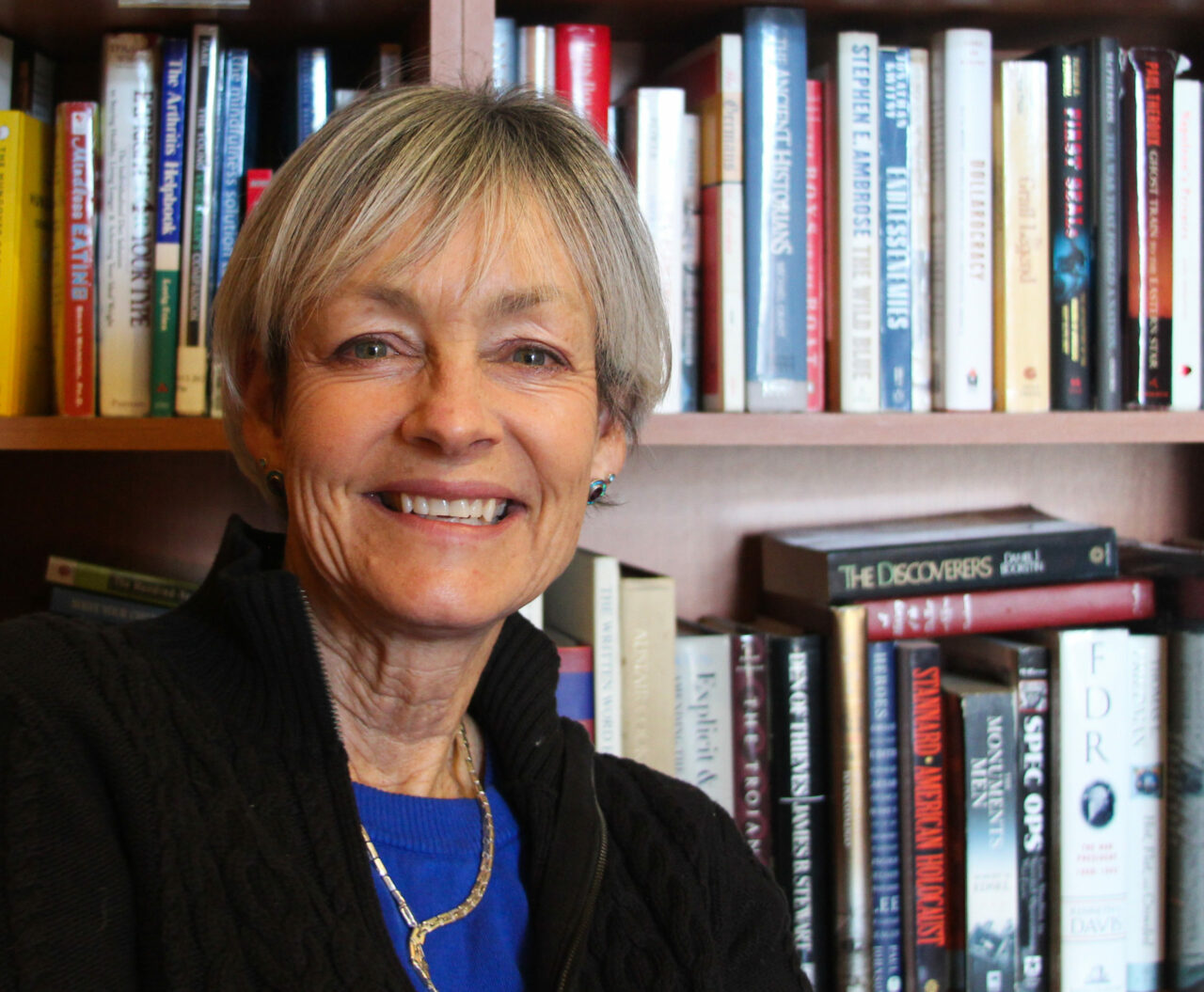
Photo by Ken Lutes
“In Florissant, there was this ancient volcano that erupted all the time, and that’s why there’s all those fossils there.” Regis University professor and poet Kathryn Winograd is talking about Florissant Fossil Beds National Monument, in Teller County. It’s in this part of Colorado where she found inspiration for her newest book of essays, “Slow Arrow: Unearthing the Frail Children.”
Winograd said the premise of the book evolved from a series of events involving her mother’s move to Colorado. She said her mother was going blind, wanted to die, and wanted Winograd to be the person to help her through that. “I started taking her on these little trips around my cabin, to various areas, to Florissant National Monument, a wolf sanctuary, gold mines.
“The book is of us traveling to these various places, and braided in there is the natural history, the biological history, the physical geography of those areas, the animals and the beautiful things that live there. My mother and my husband Leonard have roles through all these essays.”
The book title is a combination of two prominent essay titles in the book. “Slow Arrow” received inspiration from a Fredrich Nietzsche quote and is about beauty that exists in the transient nature of all things “cycling into transcendence.” Nietzsche said the slow arrow of beauty is the noblest kind of beauty that “does not transport us suddenly…but which slowly filters into our minds.” For Winograd, a “slow arrow” was falling in love with the Teller County cabin where she and her husband live. “We found our land, and I didn’t realize the richness.”
Of “Unearthing the Frail Children,” Winograd said that back in the 1800s, a woman named Charlotte Hill, a Florissant homesteader turned fossil hunter, discovered the very first butterfly fossil found in North America. Nineteenth century entomologist Samuel Scudder called butterflies ‘the frail children of the air’ and gave Hill’s butterfly a name, “prodryas Persephone, for the mythic girl stolen from a field of flowers by love-sick Hades.”
“I find my inspiration in nature, the environment, and in people, how they are moving in with the landscape. When I wrote the beginning of these [essays], I just wanted to write about the environment, and I was using the cabin area as a microcosm of what I saw as the larger, worldwide, environmental issues and the beauty of the natural wonders that were there. But even as I wrote about those things, I knew that they were serving as metaphors for things that were happening in my family.”
Winograd was 12 when her family moved from an Ohio suburb to a farm in Loveland, Ohio. “That was a seminal moment for me. I lived there until I was 18 and left for college. The farm was 35 acres behind a graveyard, with ponds, and we were allowed to have every kind of animal that we wanted. I used to ride on horses in the woods, and there was a big barn with a beautiful hayloft.” Winograd’s previous book, “The Phantom Canyon,” flips back and forth between references of that farm and the cabin in the mountains where she now lives.
“When I took my mother to see the land that we bought [in Teller County]–the land that we were so lucky to get–she started crying. She said she never thought we’d have a place as beautiful as she did on the farm, and it made her sad. She missed her farm. I think that farm made me love nature and the environment–so many metaphors and images come from there.”
The first time Winograd knew she wanted to be a writer was on a gray day in high school, when a date failed to show up. “I was so unhappy, I went to my room and I started writing a poem. I was halfway through that poem when I thought, ‘I don’t really care if that guy stood me up. I’m having a great time.’
“I put my poetry into all my prose now. I tell my [poetry] students they’re making a mistake if they don’t look into creative nonfiction as well. Creative nonfiction runs the gamut from strict non-fiction and journalism, to lyrical essays, which are so closely related to poetry. [Writers] can bring their gift of poetry to prose and come up with something really beautiful.”
Winograd advises writers not to be limited to a particular genre. “I think the different genres you write can influence each other in good ways. Explore all options. Then, I would say to write a lot on your own and to read a lot, to get a sense of who you are as a writer–before you go out and join a writing group that will influence you. You want to have the essence of who you are in your writing, and not let that be dictated by a group of other people. I think that can be one of the dangers of a workshop. I do share work with writers that I trust, if I get stuck.”
As she was writing “Slow Arrow,” Winograd said she “realized–and at the very end of the book, I talk about this–the frail children are my mother and my father, and I realize that I am one of the frail children as well.”
Visit kathrynwinograd.com to learn more about this award-winning author, upcoming events and ordering options, which include BookBar (bookbardenver.com), 4280 Tennyson St, in Denver’s Berkeley neighborhood.

Be the first to comment